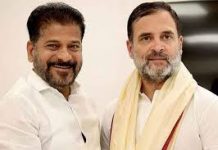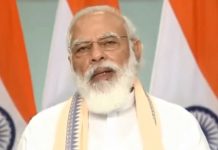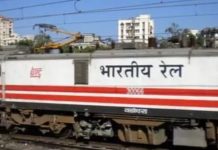 BJP president Amit Shah has emerged as a highly powerful politician for mastering the art of influencing a massive mandate for his party in the recently held elections for the Rajya Sabha where the saffron party has now attained the status of the single-largest party. His master stroke in election management of Rajya Sabha seats from Uttar Pradesh witnessed fine engineering of cross-voting resulting in humiliating defeat of the jointly fielded candidate of Opposition parties from Bahujan Samaj Party. However, the aftermath of the elections to the Upper House of Parliament has thrown a much bigger challenge for the BJP to counter the upcoming grand alliance — a Mahagathbandhan – of Congress-SP-BSP-RLD and other likeminded smaller parties who are bent upon preventing its victory in the 2019 Lok Sabha elections.
BJP president Amit Shah has emerged as a highly powerful politician for mastering the art of influencing a massive mandate for his party in the recently held elections for the Rajya Sabha where the saffron party has now attained the status of the single-largest party. His master stroke in election management of Rajya Sabha seats from Uttar Pradesh witnessed fine engineering of cross-voting resulting in humiliating defeat of the jointly fielded candidate of Opposition parties from Bahujan Samaj Party. However, the aftermath of the elections to the Upper House of Parliament has thrown a much bigger challenge for the BJP to counter the upcoming grand alliance — a Mahagathbandhan – of Congress-SP-BSP-RLD and other likeminded smaller parties who are bent upon preventing its victory in the 2019 Lok Sabha elections.
The polity of Uttar Pradesh has been undergoing a sea change with realignment of grassroots political equations in the wake of which two bitter adversaries — Samajwadi Party and Bahujan Samaj Party — have come closer and announced to take on the BJP in the general elections of 2019.
Samajwadi Party’s patriarch Mulayam Singh Yadav and founder of Bahujan Samaj Party Kanshi Ram had conceived and entered a similar pre-poll alliance in 1993 to counter the growing influence of BJP, who was spearheading the Ram temple movement at that point of time by dividing society on caste and communal lines. This experiment of combining Dalit, OBC and Muslims defeated the aspirations of the BJP and paved the way to form the Mulayam Singh Yadav-led colition government in the state. The famous slogan during 1993 electioneering was “Mile-Mulayam Kanshi Ram, Hawa Mein Ud Gaye Jai Shri Ram.”
The caste chemistry, that they initiated together, demolished upsurge of BJP which emerged as a strong political force after the foundation laying ceremony of Ram Temple outside the disputed area at Ayodhya on November 10, 1989. It was done on the advice of Arun Nehru during the Congress regime that allowed RSS outfit Vishwa Hindu Parishad to perform the religious rituals with immense fan fare.
Interestingly, after Rajiv Gandhi’s assassination, Arun Nehru deserted the Congress and joined Janata Dal. Thus, Congress had committed a major political blunder by trusting his advice, first allowing and then stopping the construction of the temple in Ayodhya on the pretext of growing communal tension and law and order. This incident was the starting point of alienation of Muslims from Congress fold and decline of Congress rule. Muslims found a friend in Mulayam Singh Yadav due to his supportive aggression for them and upper caste Hindus too were not appeased by such an action from the Congress government.
In this backdrop, the SP-BSP alliance was an eyesore for BJP as it created a major roadblock for the BJP to come to power as their collective vote strength was much higher than other political parties. So, the BJP started exploiting the inner conflicts of interests between inexperienced alliance partners and worked on a well-planned strategy to break the coalition. Ultimately , the alliance broke down as the BSP withdrew its support and in a violent reaction, the SP executed an attack on BSP supremo Mayawati on June 2, 1995 at the State Guest House where she was lodging. It was BJP stalwart Brahm Dutt Dwivedi who saved her life from hooligans. It was made into a big political issue in Parliament by the Atal-Advani duo who granted support of his legislatures to BSP to form the government. Mayawati was sworn in as chief minister by the then Governor Moti Lal Vora on same night. Though Mayawati formed a coalition government with BJP, this arrangement fizzled out during Kalyan Singh’s regime.
Since the State Guest House episode of June, 1995, there has been personal hostility between the SP and the BSP and efforts to bring them on the same platform failed prior to 2017 assembly elections when Congress wanted the BSP to join the grand alliance to fight against increasing might of the BJP. The unexpected setback of the 2017 assembly election was a fundamental lesson that forced Mayawati to join the alliance to counter BJP president Amit Shah’s political acumen, as his strategies manoeuvred desertion of a considerable vote chunk of both the parties, in particular non-Jatav Dalits and non-Yadav OBCs. Both of them were uncertain about their future prospects before the unstoppable victory journey of BJP that has captured 21 states under its rule.
After suffering a humiliating defeat in Gorakhpur and Phulpur by-elections, represented by Chief Minister Yogi Adityanath and Deputy Chief minister Keshav Prasad Maurya, BJP chief Amit Shah wrote revenge script — how to take on Mayawati and ensure defeat of BSP candidate Bhimrao Ambedkar in Rajya Sabha elections. Subsequently, Ambedkar was defeated by BJP nominee Anil Agarwal in a close contest after BJP leaders managed cross voting for its ninth candidate. BSP national general secretary Satish Chandra Mishra told Tehelka, “BJP had won the seat through manipulation and use of money power. Our alliance partners, the Samajwadi Party and Congress, stood up to their commitment.” Despite the defeat Akhilesh Yadav passed the test of trustworthiness in the eyes of BSP supremo Mayawati as all his members voted for the BSP nominee.
The BJP registered a massive victory, as it won nine seats from Uttar Pradesh. The BJP members who won eight seats with ease are Union finance minister Arun Jaitley, Ashok Bajpai, Vijay Pal Singh Tomar, Sakal Deep Rajbhar, Kanta Kardam, Dr.Anil Jain, Harnath Singh Yadav and GVL Narasimha Rao.
Though BSP lost the Rajya Sabha seat, mutual trust between the two leaders further matured and they announced that SP-BSP alliance would be continued in the up-coming 2019 elections to the Lok Sabha and will try to form the great alliance by associating with other likeminded political parties.
The polity of the most crucial state, Uttar Pradesh, is going to see fresh realignments and new experiment of caste mechanism that is driving the governance of the day not only in the state but at the Centre also. The 2019 general elections are going to present a united fight before Prime Minister Narendra Modi as his opponent parties have come together against his policies and taken account of his promises and achievements. So, BJP president Amit Shah is likely to face really tough times ahead of next year’s elections to the Lok Sabha that could be the biggest challenge for him to retain power at the Centre.
letters@tehelka.com













